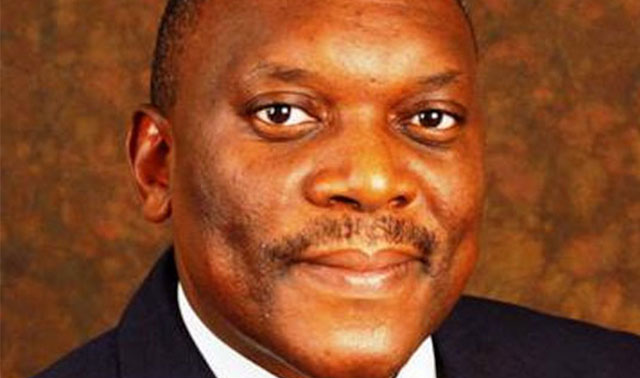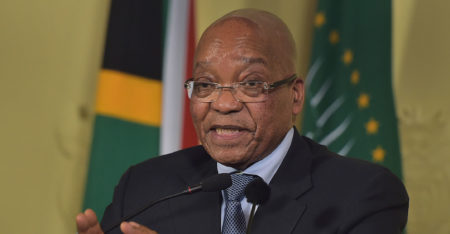
President Jacob Zuma’s daughter, Thuthukile, may have made history as South Africa’s youngest head of a minister’s office.
From a lowly public liaison officer to the powerful position of chief of staff within two months at the age of 25, she now earns almost a million rand a year.
Her dramatic rise to the position, which she assumed in May after the appointment of her father’s new cabinet, has raised concerns about political nepotism at the renamed department of telecommunications and postal services.
It appears the post was never advertised, although ministers have the prerogative to make these appointments without going through the normal processes. Several departments do advertise such posts to ensure they attract the best-qualified candidates.
Thuthukile is the youngest of the president’s four daughters with ex-wife Nkosazana Dlamini-Zuma, a former cabinet minister who is currently chair of the African Union Commission.
Thuthukile now occupies a similar position to Lakela Kaunda, President Zuma’s chief of staff, who is considered to be one of the most powerful senior managers in the government.
Most chiefs of staff are appointed at chief director level — earning an all-inclusive package of R934 000 — but ministers can motivate for the incumbent to be appointed as deputy director-general, the second highest position in the civil service, a government official confirmed to the Mail & Guardian.
“There is an HR procedure for an upgrade of posts, but ministers’ requests are rarely turned down,” the government official said. It is not clear which level Thuthukile is on.
A chief of staff position requires “extensive management experience, an understanding of ministerial services and parliamentary functions to take charge of the overall management of the ministry, knowledge of the Public Service Management Framework and Public Finance Management Act”, according to several job advertisements for the position that the M&G has seen. The chief director position requires at least five to 10 years’ experience at senior management level.
Shortly after completing her undergraduate degree in 2011, she worked — or “volunteered”, according to the ANC — at the ruling party’s headquarters. She subsequently joined the State Security Agency and spent less than a year there.
The University of the Witwatersrand confirmed that Thuthukile graduated with a bachelor of arts degree in April 2011 and received an honours degree in anthropology in June 2012.
Political appointment
One public servant maintained that a chief of staff position is a political appointment and that ministers do not consider a candidate’s managerial experience, but several ministries have advertised such positions with strict senior managerial requirements.
Soon after the elections in May, Thuthukile followed Zuma loyalist Siyabonga Cwele from the State Security Agency to the new telecommunications ministry, where he was appointed minister.
Apparently, a formal complaint has been lodged about the appointment, according to M&G sources, but this could not be confirmed independently.
Ministerial spokesperson Siya Qoza told the M&G that there are no human resources complaints relating to Thuthukile’s appointment. “We have checked with the department’s human resource management unit and they have assured us that there is no record of a complaint about Ms Zuma’s appointment,” he said.
A chief of staff is responsible for the overall management of staff and the office’s budget in the ministry, making it a very powerful position. Although directors general are responsible for the overall budget, they — according to a government official — tend to delegate this function to chiefs of staff.

According to the estimates of national expenditure for the current financial year, the chief of staff will manage a R4,1m budget in the telecoms and postal services ministry. As head of the ministry, Thuthukile will play a critical function in the interface between the ministry and the department.
A recent vacancy advertisement for chief of staff in the ministry of evaluation and monitoring in the presidency — similar to the post Thuthukile now holds — indicates that a chief of staff would also act as a primary point of contact for the department’s director-general on behalf of the minister.
A chief of staff can even be a proxy for the minister himself, as a ministerial representative, if delegated by the minister.
Depending on the size of the ministry, the number of employees under the chief of staff can vary between 10 and 20 people, including ministerial spokespersons and very experienced staffers.
Even though ministerial advisers report directly to the minister, in some ministries chiefs of staff call the shots and regulate the advisers’ access to the principal. Depending on their relationship with the minister, some chiefs of staff even write speeches and act as de facto chief advisers to the politicians.
Before she joined telecoms, Thuthukile served as a public liaison officer at the State Security Agency “for just under a year”, according to agency spokesman Brian Dube.
Thuthukile then moved with Cwele to the new portfolio two months ago, where she was suddenly promoted to the powerful position that manages almost all the minister’s business.
Contract appointment
State Security referred all questions to Cwele as the person who had appointed Thuthukile in the new department. Qoza confirmed that Thuthukile has a contract appointment at the ministry, but he would not respond to questions about her relevant experience for the role, saying only that it is “consistent with the rules and regulations governing the appointment of people in government ministries”.
According to Qoza, this, together with her academic qualifications, secured her the job. “Ms Zuma has worked with the minister before,” Qoza said. “The minister only considered her capacity for the job and her qualifications.”
Thuthukile refused to discuss her experience and why she qualified for the job when the M&G contacted her.
“Please direct all questions to the relevant department’s spokesperson. I do not answer questions on behalf of the department,” she said, before abruptly putting the phone down. Thuthukile’s Twitter account carried retweets from the telecoms department’s official account, but she deleted the account shortly after the M&G sent questions to Qoza, who reports to her. She also removed all the pictures from her Instagram feed, which largely captured her support for the ANC, particularly around the last elections.
Qoza defended Thuthukile, saying: “Just like all citizens, [she] enjoys the freedom to participate in any economic activity, including being employed in government or the private sector.”
Thuthukile’s predecessor in the role was Siphokazi Shoba, who left the ministry when the term of Cwele’s predecessor, Yunus Carrim, came to an end, affecting her contract. Unlike Thuthukile, Shoba has the requisite management experience, as she was previously in a management role at the department of co-operative governance and traditional affairs. She served as chief of staff at the communications ministry, as it was then known, from July 2013 until May this year. — (c) 2014 Mail & Guardian
- Additional research by Pauli van Wyk
- Image: World Economic Forum
- Visit the Mail & Guardian Online, the smart news source




